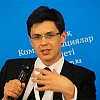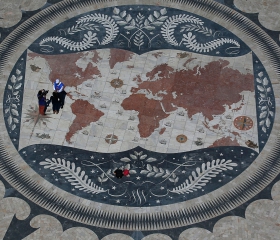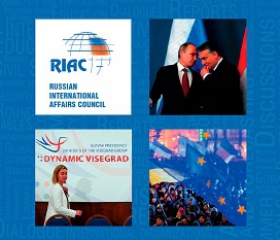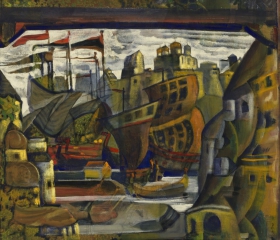Two events in the last month have finally set the record straight with regards to the geo-economic picture of the future of Eurasia. The November letter to the Russian President of Jean-Claude Junker, President of the European Commission, actually demonstrated that the EU has turned an old shoulder to the EEU; Moscow, in turn, suggested that the Union place a particular emphasis on developing cooperation with the East. The creation of a common economic space from Lisbon to Vladivostok has again been postponed indefinitely.
From dream to reality
The idea of Greater Europe representing a political dream of Charles de Gaulle began to evolve into the subject for practical debate at the highest level only because of the crisis in the current system of international relations. The concept of “Integration of integrations” was expected to become a tool for harmonizing the interests of the EU and Russia in the post-Soviet space. Difficulties began to grow in the 2000s, following the wave of “color revolutions” and in the wake of Moscow’s increased foreign policy attention to its nearest neighbors.
As a result, in 2013 Prime Minister of Ukraine Mykola Azarov proposed creating a tripartite Russia-Ukraine-EU commission as a solution to the problem of choosing between the European Union and the Customs Union. No matter how difficult it is for Kiev’s politicians and experts to admit it now, this compromise step did allow for the interests of Ukraine to be represented, which at that time was far from united on the issue of the “European choice.” The country could have minimized the risks incurred by entry into the European trade area, but, more importantly, the Commission could have initiated decisions shaping the future model of cooperation between the two largest unions in Eurasia. Russia supported the proposal, and Greater Europe seemed to be taking a somewhat clearer shape. However, Linas Linkyavichus, Foreign Minister of Lithuania, which held the EU presidency at that time, unambiguously refused to support this idea on the very next day after Kiev put it forward, saying that “We (the EU) see no role for third countries in this process.”
In fact, Russia was denied the right to have its interests in the post-Soviet space. This position, of course, excludes the possibility of building a Greater Europe as a matter of principle. However, the problem lays not so much in the refusal to make this inspirational idea of a common space of security and development come true, as in the resulting reverse process, but namely in the polarization of the post-Soviet space and the dividing of the countries into “us” and “them,” as well as in the crisis in Russia's relations with the West, the scale of which few could predict in advance. Therefore, after two years it was important to return to the strategic issues of the two integrations’ coexistence.
The rationale of another attempt
Over the past two years, the conditions for dialogue between Russia and the European Union have changed dramatically.
The high risk of destabilization of post-Soviet states with weak economic and political systems has become apparent. While the basis for this destabilization has domestic grounds, external geopolitical conditions may act as a catalyst to crises. In their development, the post-Soviet countries have passed the point at which one could demagogically write off all socio-economic problems as “unavoidable costs” of the democratic and market transition or the aftermath of the Soviet past. After 25 years of independent existence, the ruling elites bear full responsibility for failed public policies. The geopolitical choice made by Ukraine in 2013-2014 only pushed the country to the brink of a precipice which had been created by Kiev’s politicians over many years.
Russia has openly shown that it does not agree to consider the post-Soviet space as a territory without its interests. This does not mean that Moscow regards the region as part of its “exclusive sphere of interests,” as a number of Ukrainian experts and politicians today try to assert. Developments in the Donbass region and especially in Crimea have shown that Russia's influence on society in these countries is not a diplomatic bluff or a propaganda ploy, but an objective reality that must be taken into consideration by external actors in the region. Moscow’s foreign policy formula is quite simple: the post-Soviet space is the area of not exclusive, but of strategic interests of Russia, particularly in the field of security, so any steps that affect these interests should be discussed.
Therefore, another element that has become apparent over the past two years is the need to establish mechanisms for harmonizing the interests of all the key actors in the international dialogue in the post-Soviet space. Accordingly, the matter in question is not just the interests of Russia or the EU, but, of course, the interests of Ukraine, Georgia, Moldova and other countries in the region too.
The crisis in international relations has testified to another important fact: the policy of sanctions has proven to be ineffective in terms of its impact on Russia's foreign policy. Allegations that “without sanctions, the Kremlin would never have agreed to the Minsk II package deal” look more like indulging in wishful thinking. The measures listed in Note 1 to the Minsk II Agreement reflect in its entirety the position that Moscow had taken from the beginning of the Ukrainian crisis. As for domestic policy, the sanctions, at least, have not worsened indicators of public support for the country's leadership. Meanwhile, since western countries are not abandoning the policy of sanctions, it conveys the suggestion that their goals go beyond an attempt of exerting influence on the Russian president and his entourage. These goals are no longer tactical, but strategic, namely a hampering of Eurasian integration, which involves developing a common economic policy (and, accordingly, on the issues of sanctions/counter-sanctions).
Achieving the above goal has become particularly important for the western countries due to another new factor in the Russia-EU dialogue: in 2014 the Eurasian Economic Union was established as a subject of international relations and has since then expanded through the accession of two more countries, has come to an agreement with Vietnam on a free trade area and with China on cooperation in coordinating development of the EEU and a major infrastructure project the Silk Road Economic Belt.
Currently, the integration process is stalled due to the international economic crisis and certain political factors, namely the “war of sanctions.” In fact, in October 2015 Chairman of the Board of the Eurasian Economic Commission Viktor Khristenko made an attempt to remove at least the second barrier by an Aide-Memoire “Eurasian Economic Union – European Union: Cooperation Outlines,” which proposed a dialogue on the spheres that are important for trade and economic cooperation as well as discussing such issues as a reduction of barriers to trade, harmonizing customs regulations and others.
At first glance, this partnership proposal has been made at an unfortunate time of an exacerbating crisis in international relations. However, the proposed measures, just as the idea of a tripartite commission in 2013, were aimed exactly at slowing down the process of Eurasia splitting into opposing camps.
Jean-Claude Junker’s answer submitted a month later testifies to the fact that Europe’s ill-preparedness for such an interaction strategy has not been situational, as it could have been in the year of the Vilnius summit: this attitude is taken in both pre-crisis and crisis times. Brussels does not view integration of integrations as a way of solving problems in relations with Russia in the post-Soviet space. On the contrary, it turns out that the crisis in relations is being used as an excuse for not seeking a compromise or a new format of cooperation, which could help bring the positions of the parties closer together.
In different corners of Eurasia
Europe and Russia have fundamentally different views on the future of Eurasia and interaction formats. The EU dialogue with Ukraine in 2013 and with Belorussia reveals the characteristic features of the Brussels’ eastern policy, which is unacceptable for the Russian side.
Linking economy with politics. Economic cooperation between the EU and its Eastern partners is seen by Brussels as doing its neighbors a kind of “favor.” As a consequence, economic initiatives are coupled with political demands, aimed to bring “backward” state systems closer to “high” European standards. In the case of Kiev, these strict demands for Ukraine have been set forth, for example, in the so-called Fule’s List; in the case of Minsk, the demands took the shape of revived consultations on human rights, notwithstanding the parties’ exact antipodes of opinion on the situation around human rights in Belorussia.
The policy of “trial periods.” Western countries always retain the ability to quickly phase out normalizing relations, should “democratic progress” in this or that country fail to come up to their expectations. It is the opinion of European officials that constitutes the sole criterion for the progress made. The strategy of “suspended carrot” per se is eloquent of the alignment of roles in international politics: the West is the doctor, who cures the patient’s “dictatorial dependence.”
Limited financial resources. This characteristic feature is most vividly illustrated by comparison. So, China is planning to invest 40 billion dollars in the New Silk Road project and another 46 billion dollars in the economic corridor in Pakistan, which will give China a direct access to the Indian Ocean. The annual budget of the EU Eastern Partnership program is about €600 million. Obviously, Europe sees no strategic benefits in the eastern vector of its foreign policy.
Lack of technology. Access to intellectual and technological resources for modernizing national economy is a strong argument for substantiating the advantages of European integration. In practice, however, this argument has yet to demonstrate its worth. For example, after 10 years of membership in the EU, the high-tech products of the Baltic republics are still largely uncompetitive: their share in the total volume of exports is much lower than the EU average performance (in Latvia this share is 30 percent, whereas the EU average is 53 percent); the average annual growth rate of employment in the innovative sector of the economy is positive only in Estonia. Jean-Claude Junker’s program of reindustrialization of Europe was intended to comprise just the EU members and did not apply in respect of associate members or other Union’s partners. In addition, in the fall 2015, the investments distribution plan was ousted by a plan to distribute refugees around the continent.
Accordingly, if the Eurasian Union continues to knock on the EU door and tap at its windows, it will face all these “features” of rapprochement with the West, let alone making this rapprochement conditional on the simultaneous implementation of the Minsk Agreements. Finally, it should be recognized that Brussels just does not yet regard the Eurasian Economic Union as a subject of international relations. It is difficult to find another explanation for the fact that, in response to the message sent to Brussels by Chairman of the Board of the Eurasian Economic Commission Viktor Khristenko, Jean-Claude Junker sent a letter to Russian President Vladimir Putin.
Russian experience in recent months shows that depoliticized interest of Western countries to their eastern neighbors arises mostly when European countries are given the Hobson’s choice. This is evidenced by the shuttle diplomacy of French president Francois Hollande aimed at coordinating the efforts of Russia and the United States in the fight against international terrorism after the tragic events in Paris, and by German Minister of Foreign Affairs Frank-Walter Steinmeier’s proposal to resume the work of the NATO-Russia Council.
Therefore, given the current situation, the right strategy for the EEU appears to be setting aside the issue of development through integration with the West and forming instead a Eurasian pole of the world economy based on cooperation with the countries of Southeast Asia. The same political line would be advantageous to Russia too, as for now the country lacks the basis for restoring relations with the EU and the US to the level of 2013. In my view, this is what underlies Vladimir Putin’s proposal to start with his EEU colleagues consultations with the SCO and ASEAN members on establishing an economic partnership.
Western countries, of course, are unlikely to seek the EEU’s isolation, but as recent developments show, the Eurasian Economic Union is objectively of no interest to them, given the creation of the Transatlantic Partnership. The EEU, in turn, is also ready to place a strategic stake on a partnership with South-East Asia, rather than Western Europe. This at the moment constitutes the common denominator of the two unions, which will shape their coexistence in the foreseeable future.








